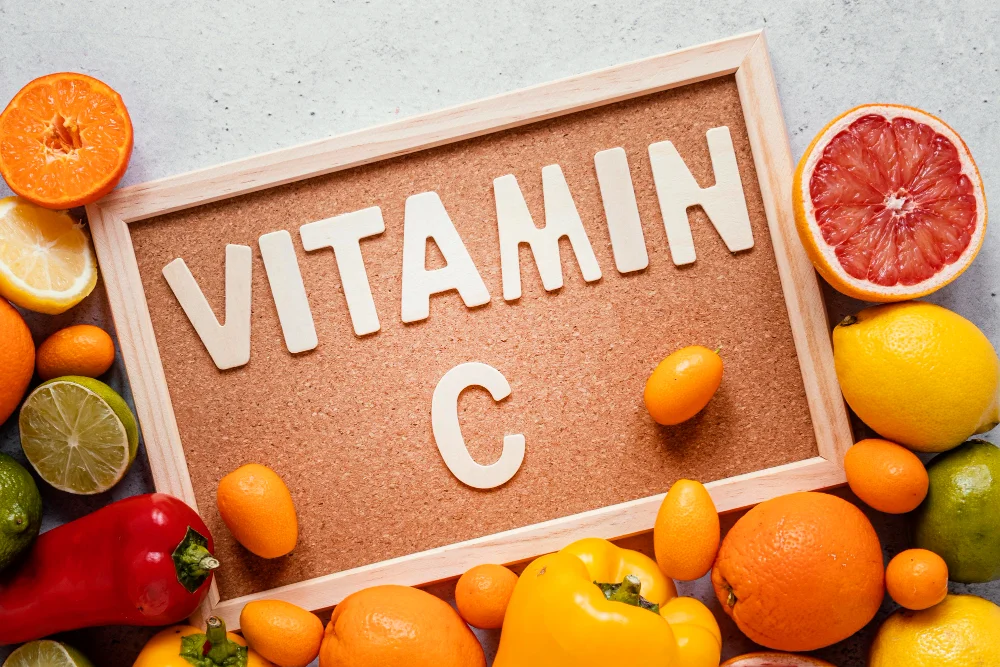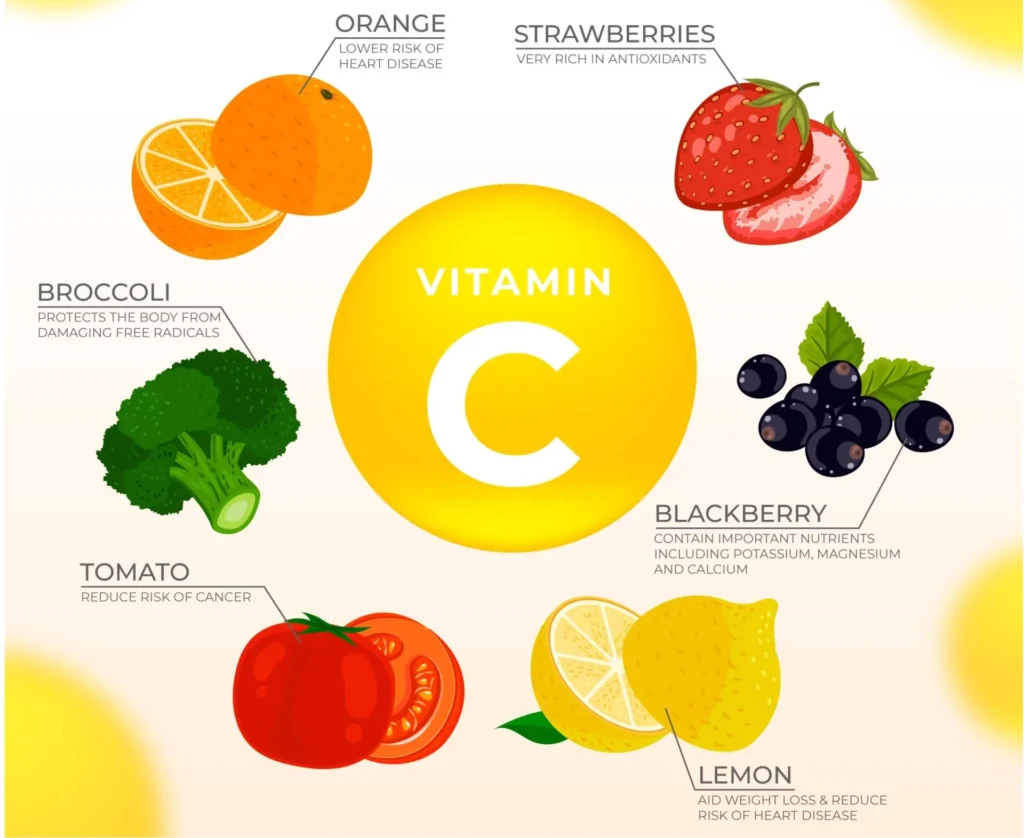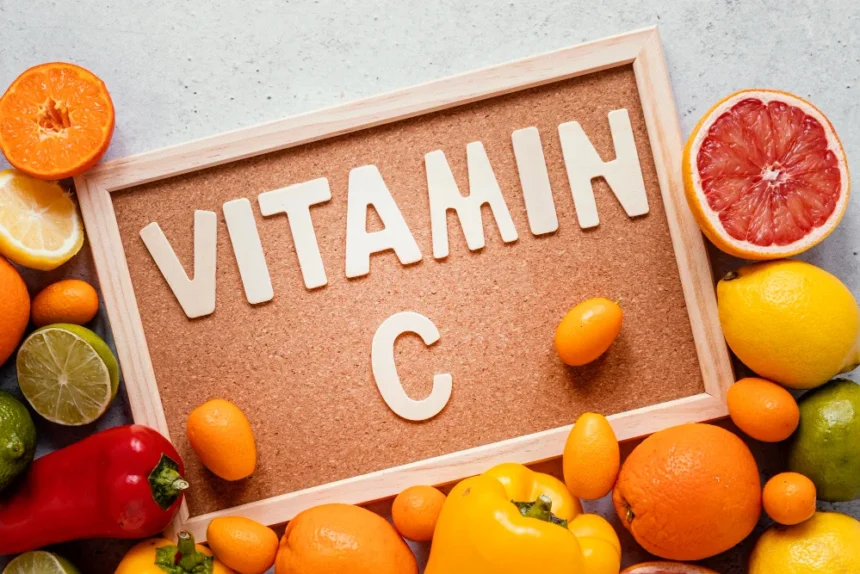
Feeling sluggish? Brain fog got you down? Worried about staying healthy during cold and flu season? You know Vitamin C is important, but did you know just how crucial it is for more than just preventing scurvy? This isn’t your grandma’s guide to Vitamin C. We’re diving deep into how this powerhouse nutrient impacts your brain health, keeps your energy levels soaring, and fortifies your immune function. Get ready to discover the science-backed secrets to optimizing your vitamin intake and unlocking its full potential.
What is Vitamin C and Why is it Essential?
Vitamin C, also known as ascorbic acid, is a vital water-soluble vitamin celebrated for its antioxidant properties. Because the human body cannot produce this nutrient, it must be obtained through diet or supplements, making it an essential nutrient. Although many people link Vitamin C with immune support during colds, its role in the body is much more expansive.
This nutrient acts as a critical cofactor in a variety of enzymatic reactions. For example, it is indispensable for collagen synthesis, a process that helps maintain the strength and elasticity of your skin, supports healthy blood vessels, and aids in effective wound healing. Additionally, this is important for neurotransmitter production, which is vital for proper brain function and overall energy levels.
1. Vitamin C and Brain Health
Although Vitamin C is best known for its role in immune support, it is equally vital for maintaining brain health and optimal cognitive function. This essential nutrient works in several keyways that go far beyond preventing colds.

How Vitamin C Supports Cognitive Function
- Antioxidant Protection: The brain is highly vulnerable to oxidative stress due to its high metabolic rate and rich content of polyunsaturated fatty acids. As a potent antioxidant, Vitamin C neutralizes harmful free radicals and protects delicate brain cells, which is critical for long-term neuroprotection.
- Neurotransmitter Synthesis: Serves as a cofactor in the production of important neurotransmitters like dopamine, norepinephrine, and epinephrine. These chemicals are crucial for mood regulation, attention and overall cognitive performance.
- Neuron Function and Development: It also plays a role in the maturation of neurons and the formation of the myelin sheath, which is essential for efficient nerve signal transmission.
- Reducing Neuroinflammation: Chronic inflammation in the brain can lead to various neurological disorders. Vitamin C’s antioxidant, and possibly anti-inflammatory, properties may help mitigate neuroinflammation.
Research and Potential
Emerging studies suggest that higher levels of Vitamin C are associated with improved cognitive performance, including better memory, focus and processing speed. While more research is needed to fully confirm these relationships, current evidence indicates that maintaining adequate vitamin levels supports overall brain function and may help lower the risk of age-related cognitive decline and neurodegenerative diseases such as Alzheimer’s.
In summary, ensuring you get enough Vitamin C is essential not only for your immune system but also for preserving your brain health. Its ability to protect against oxidative damage, support neurotransmitter production, and enhance neuron development makes it a critical nutrient for long-term cognitive vitality.
2. Vitamin C for Energy Levels
Feeling drained and sluggish can be frustrating. While many factors contribute to low energy, ensuring you get enough Vitamin C is a simple yet often overlooked step. This essential nutrient plays a key role in supporting sustained energy throughout the day.

Combating Fatigue
Vitamin C may not be a stimulant like caffeine, but it supports energy production at the cellular level through several important mechanisms:
- Carnitine Synthesis:
Vitamin C is crucial for the synthesis of carnitine, a molecule that transports fatty acids into the mitochondria—the powerhouses of your cells. Without sufficient Vitamin C, carnitine production can be impaired, leading to reduced energy generation and increased fatigue. - Iron Absorption:
This vitamin significantly boosts the absorption of non-heme iron found in plant-based foods. Iron is a critical component of hemoglobin, which carries oxygen throughout your body. Enhancing iron absorption helps prevent fatigue associated with iron deficiency and anemia. - Oxidative Stress Reduction:
As a potent antioxidant, Vitamin C combats oxidative stress, which can contribute to feelings of tiredness. - Adrenal Support:
The adrenal glands, essential for stress response and energy regulation, contain some of the highest concentrations of Vitamin C. The vitamin aids in the production of hormones such as cortisol, which are vital for maintaining energy levels.
The Deficiency Link:
One common symptom of Vitamin C deficiency is fatigue and weakness. While severe deficiency (scurvy) is rare in developed countries, even mild deficiencies can significantly impact your energy and overall performance. Research has shown that low vitamin levels are linked to increased fatigue, whereas supplementation can improve energy and physical performance.
In short, ensuring an adequate intake of Vitamin C is a smart and straightforward step to help you maintain steady energy throughout the day.
3. Vitamin C and Your Immune System
Vitamin C is widely recognized for its role in supporting a healthy immune system. As a powerful antioxidant, it plays several critical roles that help your body defend against infections.

Here’s how Vitamin C contributes to a robust immune response:
- White Blood Cell Support: Vitamin C is essential for the production and proper functioning of white blood cells such as lymphocytes and phagocytes. These cells act as the first line of defense against pathogens like viruses and bacteria.
- Antioxidant Protection: When immune cells, particularly phagocytes, attack invaders, they generate free radicals. Vitamin C neutralizes these free radicals, protecting immune cells from oxidative damage and ensuring they work effectively.
- Enhancing Skin Barrier Function: As a key component in collagen synthesis, Vitamin C helps maintain the integrity of your skin—the body’s primary barrier against infection. A strong skin barrier makes it harder for pathogens to enter the body.
Colds and Infections
While Vitamin C may not completely prevent colds or other infections, maintaining adequate levels can support your immune system’s ability to fight them off. Research indicates that regular intake might help reduce the duration and severity of cold symptoms. Think of Vitamin C as a vital supporting nutrient that boosts your overall immune function rather than a standalone cure.
Recognizing Vitamin C Deficiency
While severe Vitamin C deficiency, known as scurvy, is rare in developed countries today, milder forms can still affect your overall health. Being aware of potential signs is important so you can take action if needed.

Common Signs and Symptoms
- Fatigue and Weakness: Feeling unusually tired and lacking energy even with adequate rest.
- Easy Bruising: A noticeable increase in bruising from minor bumps.
- Bleeding Gums: Gums that are swollen and prone to bleeding when brushing or flossing.
- Slow Wound Healing: Cuts and scrapes that take longer than usual to heal.
- Dry, Splitting Hair: Hair that becomes brittle, dry, and prone to splitting.
- Rough, Dry, Bumpy Skin: Skin may turn rough, dry, and scaly, sometimes developing small bumps.
- Joint Pain: Persistent discomfort in the joints.
- Weakened Immunity: Increased susceptibility to infections.
Important Note:
These symptoms can be caused by other conditions as well. If you notice a combination of these signs, it is crucial to consult a doctor for a proper diagnosis. A simple blood test can determine your Vitamin C levels.
Getting Enough Vitamin C: Food Sources and Supplements
The best way to meet your Vitamin C needs is by enjoying a balanced diet rich in fruits and vegetables. In certain situations, however, supplements may be beneficial.

Excellent Food Sources
Incorporate a variety of these foods into your daily meals to boost your vitamin intake:
- Citrus Fruits: Oranges, grapefruits, lemons, and limes
- Berries: Strawberries, blueberries, raspberries, and blackberries
- Peppers: Bell peppers (especially red and yellow) and chili peppers
- Dark Leafy Greens: Kale, spinach, and collard greens
- Cruciferous Vegetables: Broccoli, Brussels sprouts, and cauliflower
- Other Fruits and Vegetables: Tomatoes, kiwi, cantaloupe, and papaya
Vitamin C Supplements
While a healthy diet is the primary source of Vitamin C, supplements can be a practical option for some people. These are available in several forms:
- Ascorbic Acid: The most common and readily available form
- Sodium Ascorbate: A buffered version that is often gentler on the stomach
- Calcium Ascorbate: Another buffered option that also provides calcium
- Liposomal: Designed for enhanced absorption
Recommended Daily Intake
The recommended daily intake is 90mg for adult men and 75mg for adult women.
Important Note:
It is always best to consult a doctor or registered dietitian before starting any Vitamin C supplement. They can assess your individual needs, determine whether supplementation is necessary, and advise you on the appropriate dosage and form. Supplements may be especially useful for those with limited fruit and vegetable intake, certain medical conditions or for smokers, who typically require more vitamin.
Dosage and Safety
While Vitamin C is essential for health, more is not always better. It is important to know both the Recommended Dietary Allowance (RDA) and the Tolerable Upper Intake Level (UL) for this nutrient.
Recommended Dietary Allowance (RDA):
- The RDA varies by age, sex, and other factors.
- For most adults, it is 90 mg per day for men and 75 mg per day for women.
- Pregnant and breastfeeding women have higher requirements.
Tolerable Upper Intake Level (UL):
- The UL for Vitamin C is 2,000 mg per day for adults.
- Regularly consuming more than this amount can increase the risk of side effects.
Potential Side Effects of Excessive Intake:
Although Vitamin C is water-soluble and excess amounts are generally excreted in the urine, high doses (above the UL) may lead to:
- Digestive upset: This can include nausea, diarrhea, and stomach cramps.
- Kidney stones: In individuals who are predisposed, very high doses might increase the risk, though this is uncommon at recommended levels.
- Other symptoms: Headache and flushing have also been reported.
It is best to obtain vitamin primarily from food sources. If you are considering supplements, consult your doctor to determine the appropriate dosage for your individual needs and to avoid exceeding the UL. Your healthcare provider can also advise on the best approach for your specific circumstances.
Frequently Asked Questions (FAQs)
What is the best form of Vitamin C to take?
There is no single “best” form of vitamin supplement. Ascorbic acid is the most common and well-absorbed option, while many people find buffered forms like sodium ascorbate or calcium ascorbate gentler on the stomach. Liposomal Vitamin C is another alternative that may offer enhanced absorption, although more research is needed. The best choice depends on your individual needs and preferences.
Can I take Vitamin C with other medications?
Vitamin C can interact with certain medications, including some chemotherapy drugs, blood thinners, and aluminum-containing antacids. Always consult your doctor or pharmacist before starting a supplement if you are taking any medications.
Can Vitamin C prevent colds?
While Vitamin C plays a vital role in supporting your immune system, the evidence that it prevents colds is mixed. Some studies suggest that regular intake may slightly reduce the duration and severity of cold symptoms, but it is not a guaranteed way to avoid getting sick. It is best to view this vitamin as a supportive nutrient rather than a foolproof preventative measure.
What is the difference between Vitamin C and ascorbic acid?
There is no difference between the two. Ascorbic acid is simply the chemical name.
Can I get too much Vitamin C from food?
It is very difficult to obtain excessive amounts of vitamin from food alone because it is a water-soluble vitamin that the body typically excretes when in surplus. The risks of overconsumption mainly come from high-dose supplements rather than from a balanced diet.
Is it better to take Vitamin C in the morning or at night?
Both options are acceptable. However, it is important to note that vitamin might interfere with sleep for some individuals.






